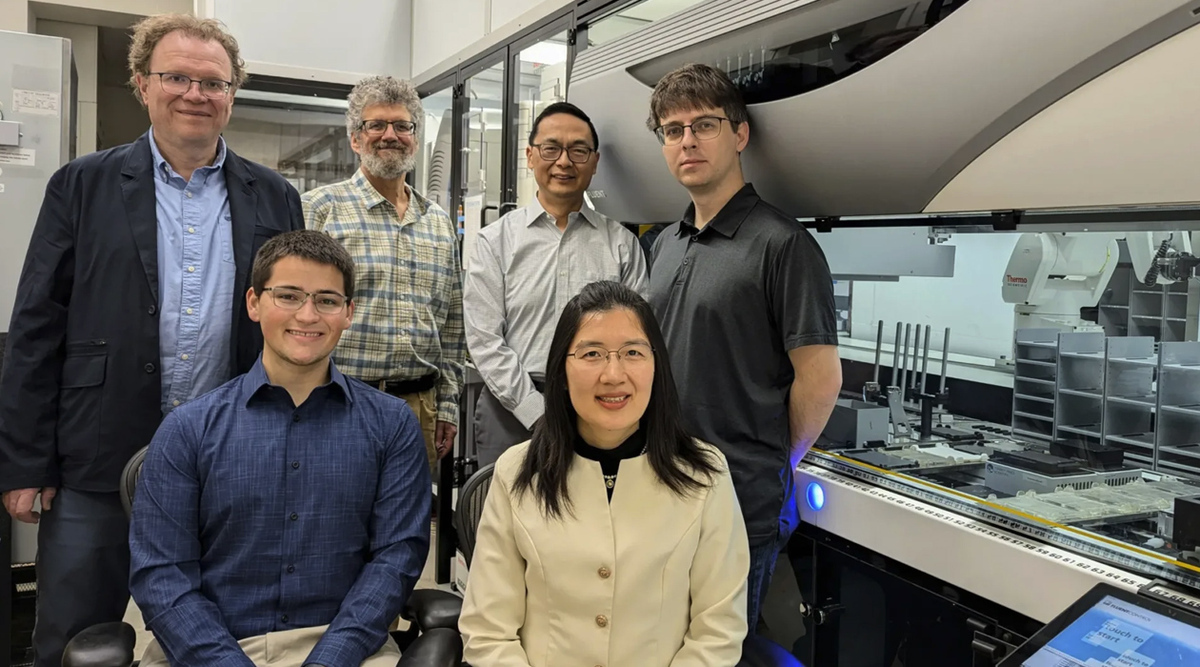
CABBI Team Accelerates Plant Bioengineering Using Robotics Lab
April 23, 2025| |
A team from the Center for Advanced Bioenergy and Bioproducts Innovation (CABBI) and partners used biofoundry to speed up genetic engineering in plants and use it to enhance oil production in plant cells. The study, published in The Plant Cell, is a breakthrough that reduces labor, time, and costs in plant bioengineering.
Biofoundry is a laboratory that combines robotics, computer-aided design, and informatics to streamline the process of genetic engineering. This fast, automated, scalable, high-throughput pipeline for plant bioengineering, called FAST-PB, can accelerate the process for rapid enhancement of key traits, such as oil production and photosynthesis efficiency.
The CABBI team combined the Illinois Biological Foundry for Advanced Biomanufacturing (iBioFAB) with single-cell metabolomics to engineer plant genomes and characterize cellular effects. The team developed three automated methods to speed up the design and testing of genetic changes in plants. “This means we can quickly create plants that produce more food and bioenergy, helping to address food and energy security, reduce reliance on imported fuels, and build a more profitable agricultural system,” Research Scientist Jia Dong said.
FAST-PB enhances plant bioengineering by automating genetic editing and metabolic analysis, allowing researchers to develop energy-rich, high-yield crops more quickly and efficiently. This innovation supports CABBI's mission to improve plant-based biofuels by enabling rapid, precise modifications to boost oil production and crop resilience. This approach offers a scalable and cost-effective pathway to advance bioenergy crop development and support the shift toward a sustainable bio-based economy.
For more information, read the article from the University of Illinois Urbana-Champaign.
| |
You might also like:
- Automated Genomics Screening to Hasten Cure to Crop Diseases
- Changing the Color of Crops Could Help Robots Differentiate Crops from Weeds
- CABBI Researchers Develop Oil-Rich Sorghum
Biotech Updates is a weekly newsletter of ISAAA, a not-for-profit organization. It is distributed for free to over 22,000 subscribers worldwide to inform them about the key developments in biosciences, especially in biotechnology. Your support will help us in our mission to feed the world with knowledge. You can help by donating as little as $10.
-
See more articles:
-
Plant
- Pangenome Reveals Genetic Diversity, Evolution, and Domestication of Rice
- Study Reveals Narrow Genetic Basis of European Potato
- CABBI Team Accelerates Plant Bioengineering Using Robotics Lab
- Experts Recommend Policy Strategies to Support Bt Cotton Adoption in India
- Late Blight Field Resistance in Potatoes With Genes from Wild Relative
-
Environment
- Long-term Study Shows GHG Emissions from Agricultural Soils
- Study Reveals How Bacteria Bypass Plant Defenses
- Researchers Develop Transgene-free Gene-edited Poplar Trees
-
Read the latest: - Biotech Updates (December 10, 2025)
- Gene Editing Supplement (December 17, 2025)
- Gene Drive Supplement (February 22, 2023)
-
Subscribe to BU: - Share
- Tweet

